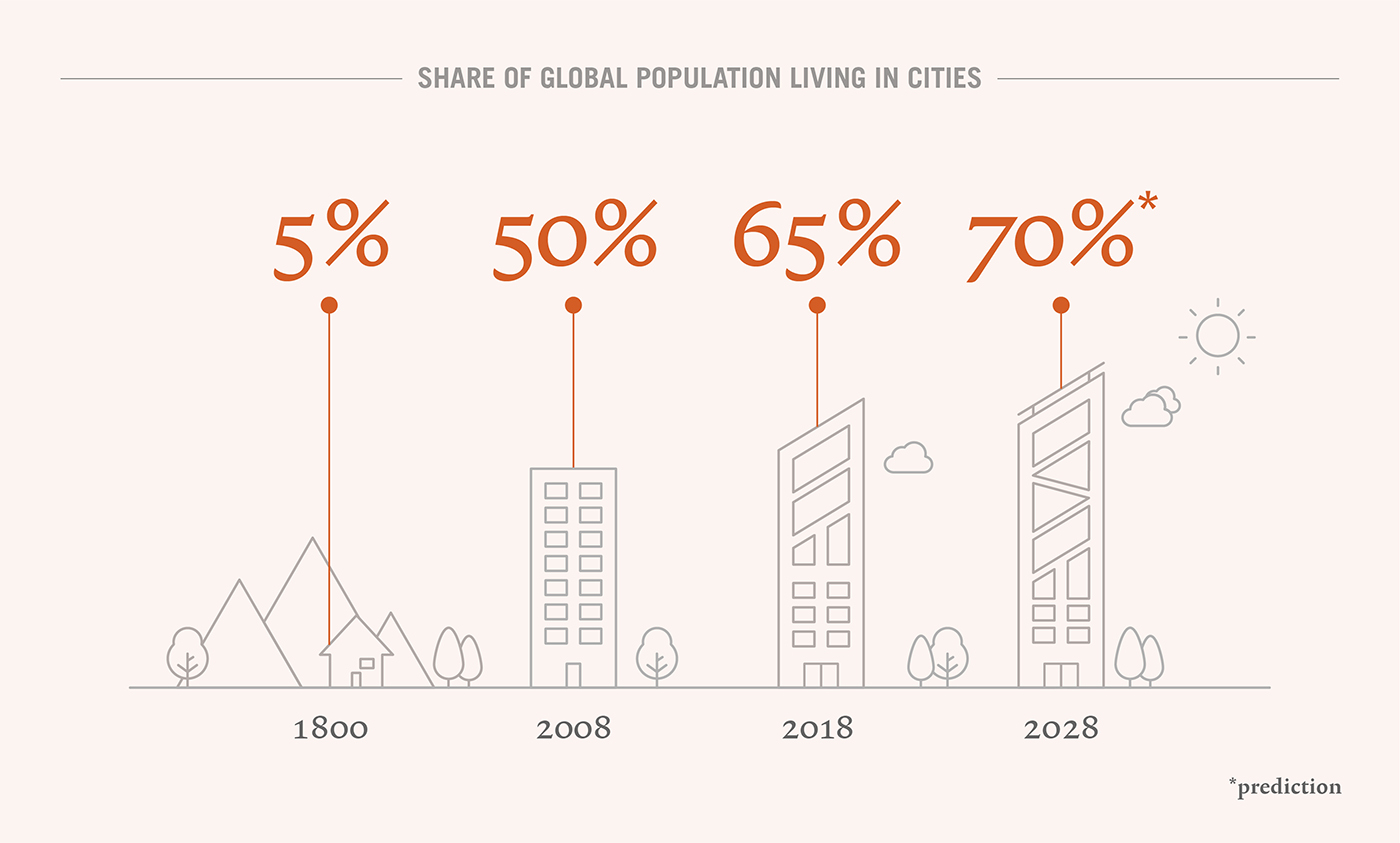23 May 2018
Urbanisation has changed the global landscape beyond recognition, exploding 200,000 years of human history in the course of two extraordinary centuries. Driving this runaway train – which shows no sign of slowing down – is one of the toughest and most important challenges facing governments today. With megacities springing up all across the developing world with unprecedented speed, has the time come for a fundamental cultural shift in urban policy?
For almost all of human history, people have lived in small towns, villages or the countryside. Over the last two centuries, however, this bucolic image has been shattered by the inexorable march of urbanisation.
In 1800 just 5% of the world’s population lived in cities. By 2008 more than half of humankind had become city dwellers, with the United Nations predicting this proportion will grow to between 65% and 70% within the next two decades.

This massive demographic transformation poses as many challenges as it presents opportunities, which means there has never been a greater need for good urban planning.
One man who knows this better than anyone is Dr Joan Clos, the former Executive Director of UN-Habitat, which has monitored the progress of urbanisation since 1978.
“Cities are productive engines of growth,” says Dr Clos. “They bring economies of scale, develop markets, create jobs and encourage new economic activities to flourish.
“In many parts of the world, city growth presents huge challenges through its impact on the environment and on political, economic and social conditions. However, such challenges can be addressed through investment and urban policies to improve the quality of urban life."
It is not just about buildings and streets: a change of culture is needed.”
Dr Clos, a medical doctor by profession, had a distinguished career in public service and diplomacy, including two terms as mayor of Barcelona.
At UN-Habitat – its full name is the United Nations Human Settlements Programme – Dr Clos presided over what he describes as an international urban observatory, investigating how cities can be managed in a positive manner and advising governments on how to improve living conditions.
“Urbanisation is a complex reality: it delivers wealth and prosperity, but at the same time it has a cost,” he adds. “Urbanisation sometimes seems to emerge spontaneously, often in the form of slums, but it needs to be improved through formal processes such as urban planning, urban design, rules and regulations.
“It is not just about buildings and streets: a change of culture is needed.”
The growth of cities was first seen in Europe and North America but in recent decades Asia has been catching up fast. It now has more than half of the world’s 40 megacities (those with more than 10 million inhabitants), while Africa is following suit and already has three megacities in Cairo, Lagos and Kinshasa.
Urbanisation is a complex reality: it delivers wealth and prosperity, but at the same time it has a cost.”
“Cities in Africa that were small towns 20 years ago are now home to millions of people,” says Dr Clos. “Migrants tend to head for the biggest cities, which can become so large that the quality of life is constrained by their growth.”
Yet there are examples of well-planned urbanisation. “Singapore was extremely poor 70 years ago and is now one of the richest countries in the world,” he notes. “What changed was the introduction of policies to address the realities of urban life in a small but densely populated city-state.
“China has also demonstrated that the pace of city economic development can be accelerated with adequate urban policies.”
There are also serious threats to be addressed: 80% of the largest cities are vulnerable to severe impacts from earthquakes and 60% from storm surges and tsunamis, while all face the impact of climate change, including rising sea levels.
Social and political crises loom just as large. Wars used to be fought outside cities but modern conflicts are turning urban landscapes into battlefields.
Nevertheless, Dr Clos is an optimist at heart. While some of the challenges are daunting, he says many cities have found ways of dealing with them.
With climate change, for example, it is vital that cities accelerate the use of renewable energy. They can also decarbonise consumption by encouraging walking, cycling and electric forms of transport, as well as constructing smart buildings.
Singapore was extremely poor 70 years ago and is now one of the richest countries in the world.”
Redistributive policies, which help defuse social tensions, are fundamentally simpler in urban areas with better food and basic services such as sanitation.
Slums are a perennial, though not insurmountable, problem. “Many cities have implemented policies to build affordable housing as alternatives,” says Dr Clos.
“It is not just a question of better buildings, however. Good jobs are also needed so that people have enough income to live in them.
“It is not rocket science but it does require a very demanding political commitment.”
In parts of the world where supplies of clean water are limited, increasing the supply requires investment in treatment plants, energy to power them and – crucially – political mechanisms to give access to everyone.
Indeed, the water issue represents the challenges of urbanisation overall, in that any solution must be based on the foundations of good planning and government.
“It can be done, even in the driest places,” says Dr Clos. ”Where there’s a will, there’s a way.”






